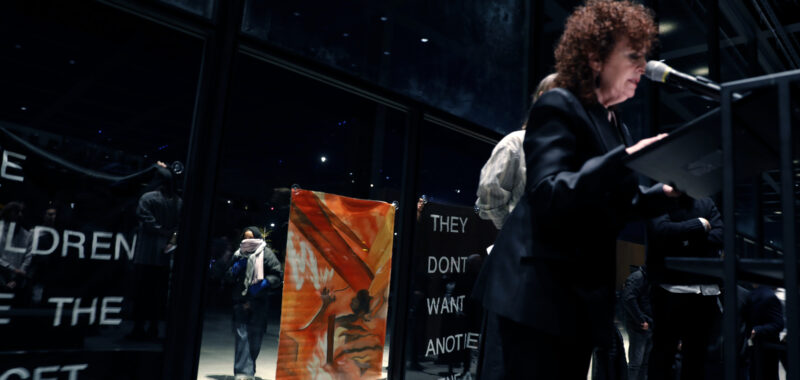Jewish-American artist and activist Nan Goldin criticized the German state and its unconditional allegiance to Israel in an incendiary speech during the opening reception for her retrospective at the Neue Nationalgalerie in Berlin last Friday evening, November 22. Her 14-minute address drew immense support from a crowd of pro-Palestine activists and artists onsite, whose chants drowned out the words of Museum Director Klaus Biesenbach who spoke shortly after. Goldin’s speech has sparked intense criticism from German politicians and administrators as the nation continues its crackdown on any speech critical of Israel or Zionism.
Upon taking the podium at the opening of her traveling exhibition This Will Not End Well, Goldin first led a moment of silence in honor of the tens of thousands of civilians killed in Gaza and Lebanon and the 815 Israeli civilians killed on October 7. After thanking the museum for maintaining its commitment to allowing her to speak, Goldin refuted the institution’s claim that her art and activism were separate.
“The last year has been Palestine and Lebanon for me. I feel the catastrophe in my body, but it’s not in this show,” Goldin said.
“Why can’t I speak, Germany?” she asked rhetorically, referring to the state’s conflation of anti-Zionism and antisemitism. “This is a false equivalency used to maintain the occupation of Palestine and to suppress those who speak out. The word antisemitism has been weaponized; it’s lost its meaning,” Goldin continued. “In declaring all criticism against Israel as antisemitic, it makes it harder to define and stop violent hatred against Jews.”

Highlighting how Berlin’s Palestinian community is the demographic’s largest diasporic population in Europe, Goldin stated that the German government has ignored Islamophobia, thus embracing state violence against Palestinians and suppressing “180 artists, writers, and teachers since October 7,” many of them Jewish.
“What have you learned, Germany?” she asked, after underscoring the International Criminal Court’s arrest warrants against Israeli Prime Minister Benjamin Netanyahu and the Israeli military’s US-backed attacks against Palestinian and Lebanese civilians. Wielding banners, flags, and signs, the keffiyeh-clad crowd shouted in response: “Nothing!”
Goldin ended her speech with a call for pro-Palestine activists to unify under the cause and amplify the voices of Palestinians, inviting cheers. When Biesenbach approached the podium, his words were practically drowned out as the crowd continued to chant.
“As I mentioned in my introduction earlier, I disagree with your opinion,” Biesenbach began in response to Goldin’s speech. “Still, I stand for your right to express yourself freely.”

“Israel’s right to exist is beyond question for us,” Biesenbach continued, speaking on behalf of the Neue Nationalgalerie. “The attack on the Jewish state on October 7th, 2023 was a cruel act of terror that cannot be justified by anything.”
Biesenbach noted that he and the museum also empathize with the civilians of Gaza and Lebanon, adding that “all people in the Middle East have the right to live without fear and with the assurance of their safety.” The director ended his speech with a rejection of the cultural boycott of Israel, citing the museum’s commitments to freedom of expression and its historical responsibility to the Jewish state, and that it will not allow “calls for or incitement to violence, the legitimization or trivialization of acts of terrorism, the injury and killing of civilians or support of terrorist organizations.”
In response to Hyperallergic‘s request for comment, a Neue Nationalgalerie spokesperson said that “slogans were shouted that do not align with the institution’s Code of Conduct.”
“The Neue Nationalgalerie explicitly distances itself from the statements made by the protesters and emphasizes its commitment to freedom of expression, respectful dialogue, and mutual respect,” the representative said.

While Goldin’s confrontational speech was met with approval by the pro-Palestine attendees, German Culture Minister Claudia Roth lambasted the photographer for her “unbearably one-sided political views,” saying she was “appalled” at the way people in the audience chanted slogans such as “Free Palestine” during Biesenbach’s address. Berlin’s Culture Senator Joe Chialo also condemned Goldin’s “one-sidedness” and “obliviousness to history,” and Hermann Parzinger, president of the Prussian Cultural Heritage Foundation, said that the artist’s speech “does not correspond to our understanding of freedom of expression.”
Conflicts simmering at the Neue Nationalgalerie in the previous weeks reached a boiling point during Goldin’s opening reception. The museum had planned a symposium titled “Art and Activism in Times of Polarization: A Discussion Space on the Middle East Conflict” for November 24 — two days after the opening of the retrospective. The boycott advocacy group Strike Germany called attention to the event, curated by Pakistani-German political analyst Saba-Nur Cheema and Israeli-German writer Meron Mendel, in an Instagram post, claiming that the symposium would be “dominated by genocide-denying Zionists while pretending to offer multiple ‘nuanced’ positions.”
Reached by Hyperallergic, Cheema and Mendel said that the symposium was meant to “create a controversial yet respectful space to discuss the role of the Israel-Palestine-conflict in the art world.”
Event panelists included South African, anti-Zionist Jewish artist Candice Breitz, Forensic Architecture’s Eyal Weizman, Israeli artist Ruth Patir of the intentionally shuttered Venice Biennale pavilion, Palestinian artist Osama Zatar, and Turkish-German artist Raphael Malik, among others, with filmmaker Hito Steyerl meant to deliver the keynote speech. Steyerl, Weizman, Breitz, and Malik withdrew from the symposium after Goldin communicated that she had not approved the program and had asked for it to be canceled.
In their emails to Biesenbach withdrawing from the symposium, both Steyerl and Breitz mentioned that their participation was contingent on Goldin agreeing to the event and fair treatment to the photographer respectively.
“It is clear to me that the museum organized this symposium as a prophylactic to secure its position in the German discussion – in other words, to prove they do not support my politics,” Goldin said in a comment on Strike Germany’s post.


